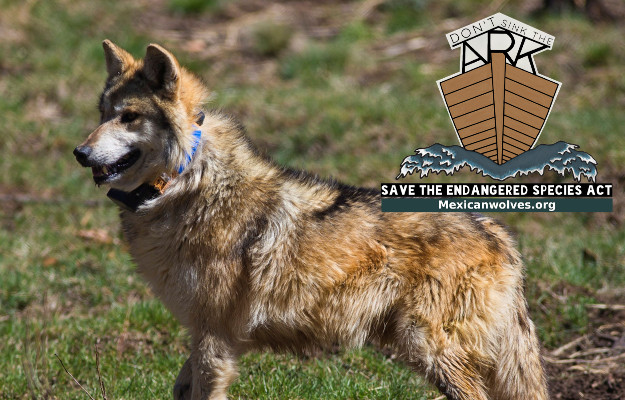27
Mar
In the News: Anti-wolf bill would turn recovery backward

Will the Mexican wolf survive? Not likely if Sen. Jeff Flake and Arizona ranchers have their way (“Moving goal for Mexican gray wolf,” Courier, Feb. 25).
Flake’s anti-wolf bill is the culmination of state and congressional assaults to shred the Endangered Species Act (ESA), emasculate wolf science, manipulate the courts, and hand the Mexican wolf recovery plan over to the Arizona Game and Fish Department (AGFD).
Flake’s Mexican Gray Wolf Recovery Plan Act would delist the Mexican wolf from the ESA based on having reached a population of 100, an interim goal set in 1982 (an updated recovery plan was developed by the Mexican wolf recovery planning team in 2005 recommending 750 Mexican wolves as a viable, self-sustaining population goal for successful recovery). The ESA saved the Mexican gray wolf from extinction as an “experimental, non-essential” subspecies of the gray wolf, but wildlife advocates have clamored for the federal Fish and Wildlife Service (FWS) to change the classification to “essential, endangered.”
Wolf activists want to expand Lobo’s recovery habitat to north of the Grand Canyon, end the practice of capturing and relocating wolves, eliminate invisible boundaries to wolf movement, end lethal removals, and supplement the wild Mexican wolf population with 300 captive-bred wolves to increase the number of packs and breeding pairs.
Flake’s Judicial Administration and Improvement Act intends to outflank environmental judicial review of delisting the Mexican gray wolf by creating a new Twelfth Circuit Court of Appeals. In a new Twelfth Circuit, Arizona would join Alaska, Idaho, Montana, Nevada and Washington where Rocky Mountain gray wolves lost ESA protections in 2011 and 2012. In Idaho and Montana, 545 wolves were killed during the 2011-12 hunting season and on March 6, 2017, gray wolves in Wyoming were delisted for a second time, inviting another open season on gray wolves.
Wolves enjoy ESA protections one day and dodge traps and bullets the next. At the heart of the war on the ESA is the open hostility of ranchers and hunters coexisting in the same landscape with wolves. This so-called “social tolerance” is the inherent conflict of interest in how AGFD itself can tolerate the Mexican wolf. AGFD’s primary constituency is hunters who resent competing with Lobo for elk and share their antipathy with ranchers. The Arizona Elk Society and the Arizona Cattlemen’s Association counteract wolf science with special interest politics.
In spite of AFGD’s political management, FWS and AGFD can point to success in bringing Lobo back. AGFD is already the lead agency in the critical day-to-day work of improving the genetic health of a growing Mexican wolf population (113 wolves in 21 packs in 2016) and aiding the survival of wild-born wolf pups (50 in 2016, twice the number as the year before). Unfortunately Sen. Flake’s Mexican Wolf Recovery Plan Act will remove ESA protections and end federal oversight, setting back Mexican wolf recovery efforts of the past 19 years.
This article was published by The Daily Courier
Dennis DuVall is a Prescott resident and Veteran For Peace.



